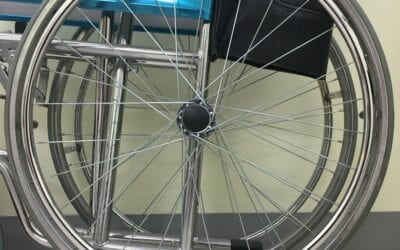The WSJ ranking of airlines only tells part of the story
The airline industry needs to take its WSJ ranking with a grain of salt. Airlines, to say the least, faced a difficult year. The minute that the government declared a shutdown of international travel on March 11, 2020, the bottom fell out of the aviation economy. Plus, the entire economy of the United States began to implode. These Wall Street Journal (WSJ) rankings were culled from the Air Travel Consumer Reports for 2020 and from Global Eagle’s aviation data platform, among other sources.
The best was Southwest Airlines. The worst was American Airlines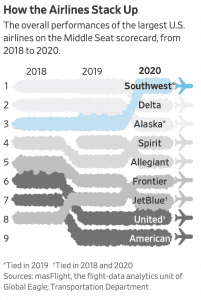
I’ll cut to the chase. The WSJ ranks Southwest best airline in America. Last year’s winner, Delta Air Lines, ranks second. United and American Airlines ranked at the bottom of the listing.
The major network carriers such as American, Delta, and United have suffered the most. Business travel ceased, even in the US. International travel sleeps basically at a standstill. Those are airlines that had invested lots of money in perfecting their business class and international route structures. Without those two income streams, they have faltered.
The midrange airlines and low-cost carriers (LCC) have done better overall than the major airlines in terms of income and layoffs.
Even strong disinfectants can’t scour off the stink of poor financials and service problems
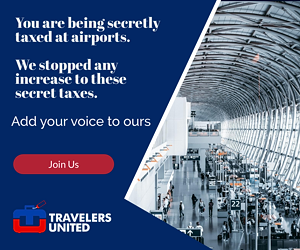
Airports are empty. So, the airport economies see contraction. Empty food courts seem spooky, and empty stores line concourses. Short security lines greet passengers. But, the problems of connections, getting to the gates on-time, shuffling down the Jetways, and maneuvering carry-on luggage, confront passengers. We all have an additional issue — wearing a facemask.
Now, take those issues and add to it a family of four or five flying is not any easier, even with fewer people. Flights depart late. Baggage is lost or damaged. Passengers face bumping. And, cancellation and change fees are a relic of 2019. But, paying the full fare for new changed flights still irritates fliers.
 Airfare refunds rate as the biggest complaint problem
Airfare refunds rate as the biggest complaint problem
Consumer advocacy groups such as Travelers United bound together to get consumers back money. The airlines worked to keep the money that they had collected. DOT, after strong action by consumer groups, mandated that airlines must refund money based on regulations. DOT mandated all flights canceled by airlines must be refunded in full to passengers, including all taxes and any fees paid. Plus, if the flights were “significantly” delayed, refunds must be paid. However, passengers who canceled their own flights were provided only a flight credit with many strings attached.
United Airlines attempted to change their contract of carriage during the pandemic cancelations. But, DOT forced them to respect the contract of carriage as of the day of purchase. Other airlines quietly refunded the money they owed passengers.’
The eruption of complaints was dramatic. No airlines have yet been punished for not following the law.
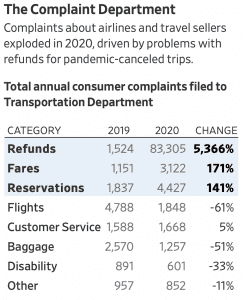
Even with the number of complaints and the obvious refusal by many airlines to refund airfares, no enforcement fines were issued. Still, none have been issued.
During the emergency, DOT faced a problem of getting money back in passengers’s hands as quickly as possible. They could have fined airlines or taken them to court. However, the time needed to go through those processes would delay real justice — getting money back in consumers’ hands.
Travelers United feels that DOT made the proper decision in this extreme situation. However, we also think that breaking the law should have consequences. This was a difficult decision.
This year’s WSJ Airline Ranking comes with many backstories — plus, the CARES Act never deals with the coronavirus but only its economic impact.
This is a year where the rankings must be put into context. The absolute rankings are only a part of the story. Another consideration must be the economic pressures that DOT and passengers were facing. Airfares often cannot be absorbed as minor expenses for families. And, the cash pressures on airlines provided the real possibility of bankruptcy. that would mean passengers would see no refunds.
Eventually, Congress passed the Coronavirus Aid, Relief, and Economic Security Act (CARES Act). It provided the airlines about $50 billion in grants and loans. However, it served as a major economic bulwark against the issues of bankruptcy and unemployment. No legislation dealt with stopping the spread of the virus. The words illness and quarantine were only mentioned six times. The words sickness, sick passenger, and contagious did not get into the bill at all, even after direct pleadings with the House and Senate Committees that constructed the bill.
READ ALSO:
Passenger-friendly data ranks 2020 best airlines
Could an antitrust bill targeting high tech also help travelers?
Charts from Wall Street Journal

Charlie Leocha is the President of Travelers United. He has been working in Washington, DC, for the past 14 years with Congress, the Department of Transportation, and industry stakeholders on travel issues. He was the first consumer representative to the Advisory Committee for Aviation Consumer Protections appointed by the Secretary of Transportation from 2012 through 2018.

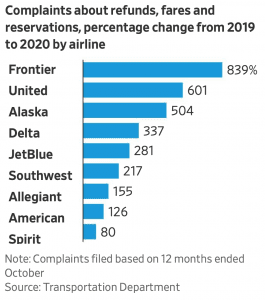 Airfare refunds rate as the biggest complaint problem
Airfare refunds rate as the biggest complaint problem 